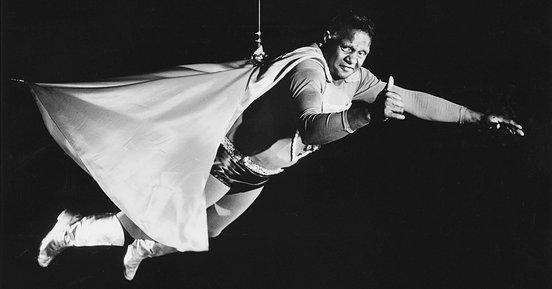
ACMI presents
Heal Country, heal our nation
My Survival As An Aboriginal (1979)
When
Tue 6 Jul 2021
6pm (AEST)
Joining our inaugural First Nations Film Club are three young documentary filmmakers to discuss the 2021 NAIDOC theme 'Heal Country'.
Aunty Essie Coffey’s iconic 1979 documentary My Survival as an Aboriginal will form the base of a conversation between our host Bryan Andy and guests Tarneen Onus-Williams, Paul Gorrie, and Kimberley Benjamin as they yarn about their own budding documentary practises and how Country holds an important place in telling First Peoples Stories.
My Survival as an Aboriginal (1979) screens courtesy of National Film and Sound Archive’s digital restoration program – NFSA Restores – reviving our cinema icons.
About our guests
Tarneen Onus Williams
Tarneen Onus Williams is a proud Gunditjmara, Bindal, Yorta Yorta person and Torres Strait Islander from Mer and Erub islands. Tarneen is living on the unceded land of the Wurundjeri and Boonwurrung peoples.
Tarneen is a community organiser for Warriors of the Aboriginal Resistance working on Invasion Day, Black Deaths in Custody and Stop the Forced Closures of Aboriginal Communities in WA. They are a filmmaker and writer and have been published in IndigenousX, The Saturday Paper, NITV and RightNow. Tarneen’s film Young Mob Questioning Treaty has been screened internationally at ImagineNATIVE in Toronto and Tampere Film Festival in Finland. Tarneen’s day job is with Aboriginal and Torres Strait Islander people who are victims/survivors and perpetrators of family violence.

Paul Gorrie
Paul Gorrie is a Gunai/Kurnai & Yorta man based on Wurundjeri Country of the Kulin Nations.
He wears many hats, most know him for drumming for DRMNGNOW and Kee'ahn but also as a DJ Paul Gorrie with mixes done with Bizarro, Triple J – Mix Up, Butter Sessions and Apple Music. He is also part of a BLK DUO Bad Kind of Good throwing a new party in Naarm called BLK ICE which centres Black DJs and experimental performers and artists, while also programming at Rising Festival in the Music Program team. Paul also is an emerging filmmaker and worked on a documentary called Young Mob Questioning Treaty on SBS/NITV that premiered at Imagine Native film festival in Toronto, Canada in 2019.

Kimberley Benjamin
Currently based in Naarm/Melbourne, Kimberley Benjamin is a proud Yawuru, Bardi and Kija woman from Rubibi/Broome, WA.
As a filmmaker, Kimberley's drive is to tell stories that are truthful, impactful and celebrate the strength and resilience of First Nations peoples and culture. She has worked as a researcher, writer, director and story producer for both television and documentary film. Having previously worked for many community organisations in Boorloo/Perth, Kimberley’s diverse work and passion for telling stories is informed by her connections and relationships with communities across the Country.

About our host
Bryan Andy
Bryan Andy is a Yorta Yorta man from Cummeragunja, NSW. He is a freelance writer, arts advocate and the current convenor of OutBlack – Victoria's lesbian, gay, bisexual, transgender, intersex and Queer mob.

Join the club
You will need to be a member of the First Nations Film Club to attend this session. By becoming a member of the Club, you'll also get a range of ACMI member benefits.
First Nations Film Club
Watch films from ACMI's collection and beyond, looking back on the trailblazing storytellers and seminal works that have paved the way for First Peoples stories on screen.

Plan your visit
Read our COVID-safe visitor guidelines, information on accessibility, amenities, transport, dining options and more.
Check out our other screen culture clubs
Community Code of Conduct
Everyone participating in an ACMI First Nations Film Club event — including, but not limited to the meets, clubs and talks — is required to agree to the following code of conduct. This includes all attendees, speakers, performers, patrons, and volunteers.
ACMI First Nations Film Club will enforce this code during its events and throughout the year. We expect cooperation from everyone to ensure a safe, diverse, and welcoming environment.
The condensed version
ACMI is dedicated to providing a harassment-free experience for everyone, regardless of gender, age, sexual orientation, disability, physical appearance, body size, race, or religion (or lack thereof). We do not tolerate harassment of participants in any form.
Sexist, racist, discriminatory, or harassing language and imagery is not appropriate in the ACMI First Nations Film Club community, in person or online. Participants violating these rules may be sanctioned or expelled from the event and premises, as well as all future events without a refund at the discretion of ACMI.
The less condensed version
Harassment includes offensive verbal comments related to gender, age, sexual orientation, disability, physical appearance, body size, race, religion, sexual images in public spaces, deliberate intimidation, stalking, following, harassing photography or recording, sustained disruption of talks or other events, inappropriate physical contact, and unwelcome sexual attention.
Exception: discussion or images related to sex, pornography, discriminatory language, or similar is welcome if it meets all of the following criteria:
— It is necessary to the topic of discussion and no alternative exists — It is presented in a respectful manner — Attendees are respectfully given ample warning and opportunity to leave beforehand.
This exception specifically does not allow use of gratuitous sexual images as attention-getting devices or unnecessary examples.
Participants asked to stop any harassing behaviour are required to comply immediately.
If a participant engages in any of the aforementioned behaviour, ACMI may take any action they deem appropriate, from warning the offender to immediately expelling the offender with no refund.
Reporting and enforcement
If you are being harassed, notice that someone else is being harassed, or have any other concerns, please contact an ACMI First Nations Film Club team member immediately. If you can’t or don’t wish to speak in person, or prefer to talk privately or electronically, reach out via our Contact Us page.
All reports will be handled in the strictest confidence.
With thanks